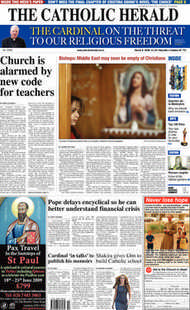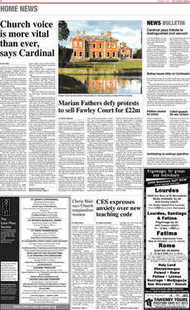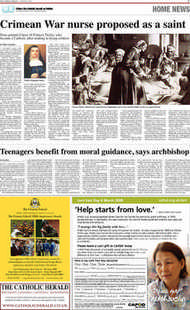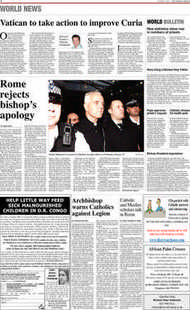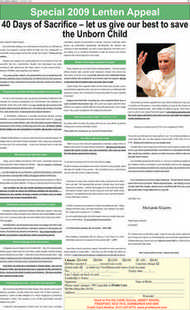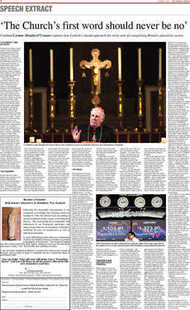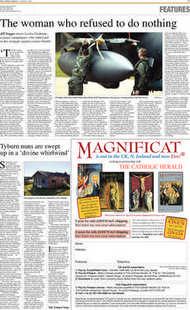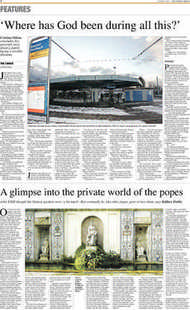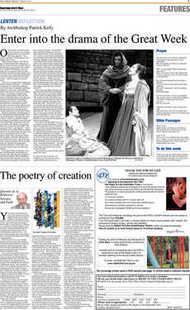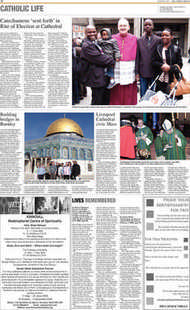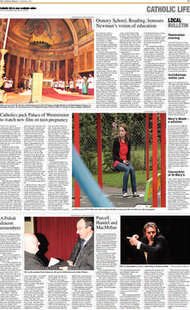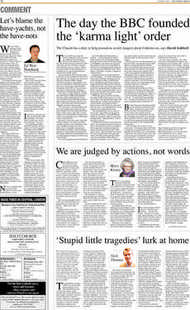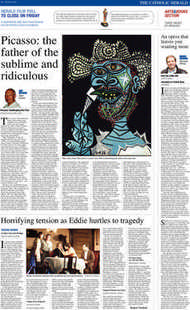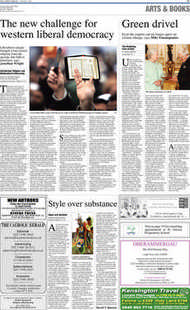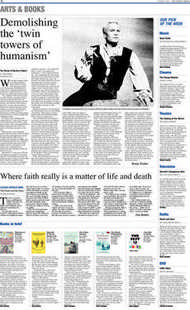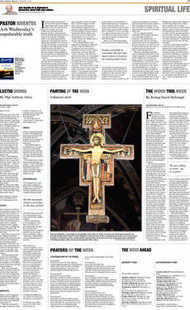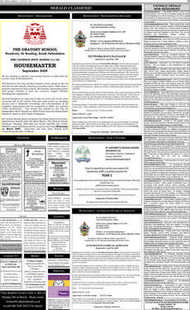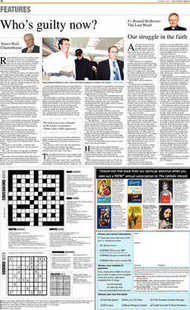Page 12, 6th March 2009
Page 12

Report an error
Noticed an error on this page?If you've noticed an error in this article please click here to report it.
Tags
Share
Related articles
Pius Xii: The Verdict Of The Eyewitnesses
Respect And Respectability
Catholic Herald Web Resources
Ten Catholics Doing Amazing Work
Pull The Plug On Anti-catholicism
The day the BBC founded the ‘karma light’ order
The Church has a duty to help journalists avoid clangers about Catholicism, says David Ashford The year 2005 was when the penny dropped for many journalists. Millions had flocked to Rome for the funeral of John Paul II and the election of Benedict XVI. The huge crowds in St Peter’s Square took the press pack by surprise. Those who had written off the importance of Catholicism as a global phenomenon were forced to think again.
And yet somehow this dawning realisation didn’t always translate into more accurate reporting. In what has now become an infamous example, a BBC subtitler referred to a group of “karma light” nuns present at the funeral of John Paul II. As if that wasn’t bad enough, noted the BBC broadcaster Libby Purves, he or she gave up entirely on the Oremus, subtitling it “Chanting in a foreign language” instead.
Four years on, sadly, things are still not that much better. A BBC poll published this past week revealed that just 45 per cent of British people think that the media report religion accurately. Thirty-five per cent, on the other hand, think that there is definitely room for improvement.
This is far from a vote of confidence. If that many people deem media coverage about religion to be inaccurate, then something is badly wrong. And what’s wrong, argues a new book profiled this past week, is that many journalists have a “blind spot” when it comes to God.
Blind Spot: When Journalists Don’t Get Religion explains why many journalists overlook, ignore or even misrepresent the role of religion in major news stories. Often, this is completely unintentional. The problem is usually a lack of religious literacy. As staff numbers dwindle across Fleet Street, dedicated correspondents with an understanding of religion are becoming a dying breed.
As a result, ignorance about Catholicism – and of the Bible and Christianity in general – is rife throughout the media. Under the pressure of unrelenting deadlines many news reports seem more reliant on Wikipedia or recycled wire copy than desk research. And so the Virgin Birth is referred to as the Immaculate Conception, the last book of the Bible becomes “Revelations” and Shrove Tuesday is badged as “Pancake Day”.
Sometimes, however, basic ignorance isn’t the problem – it’s wilful misrepresentation. Last December, the Pope gave his usual Christmas address to the Roman Curia. During this gathering he spoke at length about three major events in the life of the Church that year. These were World Youth Day, the papal trips to America and France, and the Synod on the Bible. All of these events had previously been covered by reporters across the world.
Within the speech, however, the Pope also spoke briefly of the need for an “ecology of man”. He explained that, rather than being artificial constructs, both male and female identity were deeply rooted in human nature. The Church, he said, had a duty not only to save the planet, but to save humanity from blurring these lines.
The media backlash was as swift as it was severe. “Pope likens saving gays to saving the rainforest,” screamed Reuters. “Pope says humanity needs ‘saving’ from homosexuality,” added the Metro. And so the chorus went on.
Yet Benedict had said no such thing. He hadn’t even referred directly to homosexuality at all. Ironically, he had even spoken of the importance of understanding the phrase about the ecology of man “in the correct sense”. But why let the facts get in the way of a good story? For many journalists, the Pope had decided that Christmas was a good time to bash the gays – and that was all there was to it. The ensu ing reports clearly gave the impression that homosexuality was the key theme of his speech.
Moving into this year, the bicentenary of Darwin’s birth, news headlines have often taken to sensationalising the Church’s stance on evolution. Some have given the impression that “the Vatican” has at long last come to terms with evolution. Still small voices pointed out that the Church had already given a cautious welcome to evolutionary theory in Humani Generis, way back in 1950. But many journalists carried on regardless. Just five minutes on Google, however, or a quick phone call to someone in the know could have prevented such inaccuracy.
It’s unlikely that sub-editors will also pay heed to Fr Lombardi, the Pope’s official spokesman, on another key bugbear. Towards the end of February, he stated: “It is not rare that the media attribute to the ‘Vatican’ – by which they mean the Holy See – comments and points of view that cannot automatically be attributed to it.” But the blame for misunderstanding cannot entirely be pinned on journalists. Fearful of a repeat of the Galileo incident, the Church has not always been clear enough about its current stance on monogenism, the idea that all humans physically descend from Adam and Eve. Nor has it done enough to tackle the misperception that Galileo proved the Church to be fundamentally unscientific.
After all, Pope Sylvester II was an astronomer. The learned Albert the Great, a champion of experimental science, was beatified by the Pope even as the Galileo controversy was in full swing. And it was a Jesuit, Francesco Grimaldi, who drew one of the first – and most influential – maps of the moon. But how many jour nalists are aware of this? And who is helping them to find out?
It’s very easy to criticise. Yet, until Christians start helping journalists and broadcasters to get things right – instead of wailing about what’s wrong – the situation won’t improve. I work for the Bible Society, an ecumenical organisation that helps make the Bible heard, both overseas and in this country. One of our key aims here in Britain is to help improve media reporting about the Bible. Whether it’s to do with Creationism or Zionism or other issues, the Bible regularly hits the headlines. To do their job well, therefore, even the most cynical of hacks needs a basic level of biblical literacy.
Last September we launched The Bible Style Guide, a crash-course in the Bible designed specifically for the media industry. It’s already been welcomed by journalists and broadcasters, whether believers or not. And, we hope, helped more than a few of them know their epistle from their apostle.
After all, it’s the Church’s duty to be of service to the media industry. This might sound surprising, but it’s the official line. In 1992 the Pontifical Council for Social Communications said the Church must be prepared to minister both to the “information-rich” and the “information-poor” within the media community. And without a doubt, the “karma light” brigade are definitely out there.
David Ashford is media development officer for the Bible Society. The Bible Style Guide can be downloaded from the Bible Society’s website www.biblesociety.org.uk. For further reflections on religion and the media, visit www.bitemybible.com
blog comments powered by Disqus


